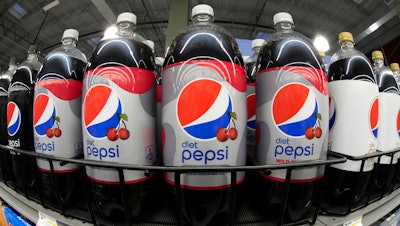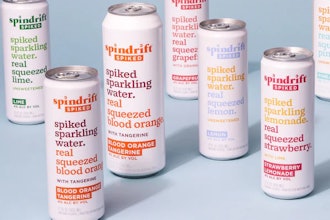
Price hikes lifted PepsiCo's profits in the third quarter, but the company says those increases are likely to moderate in the coming year.
Pepsi raised prices 11% in the July-September period, the seventh straight quarter that the Purchase, New York, company has increased prices by double-digits. The higher prices took a toll on demand, with sales volumes down 2.5%.
PepsiCo said some of that volume decline is strategic. The company said it has been shrinking package sizes to meet consumer demand for convenience and portion control.
"Units are growing much faster than volume," PepsiCo Chairman and CEO Ramon Laguarta said Tuesday in a conference call with investors.
But there is also some consumer pushback on prices. Consumers are looking for value and, in some cases, are trading down to cheaper stores.
"I do think that we see the consumer right now being more selective," PepsiCo's Chief Financial Officer Hugh Johnston said Tuesday on a conference call with investors.
Still, Johnston said convenience store sales and food service sales __ which usually weaken in times of high consumer stress __ are strong.
Johnston said Pepsi continues to see higher prices for commodities like grain and cooking oil. In 2024, Pepsi expects inflation to be slightly higher than the 2% to 3% it was accustomed to before the pandemic. Consumers should expect to see price increases roughly in line with inflation, he said.
Pepsi is watching the growing use of weight loss drugs like Ozempic, but so far their impact on the business has been negligible, Laguarta said. They could could be outweighed by other trends, including rising incomes in many countries and the growing popularity of snacking in place of meals.
"We're seeing a lot of tailwinds that will continue to drive our categories," he said.
Pepsi shares were up 1.5% in morning trading.
In the third quarter, Frito-Lay North America sales volumes dropped 0.5% during the July-September period as net prices rose 8%. North American beverage sales volumes dropped 6% as prices rose 12%.
Sales volumes in Europe were flat. Sales volumes in Latin America dropped 5%.
Net pricing includes price hikes as well as changes in the mix of products sold and smaller package sizes. In prepared remarks Tuesday, PepsiCo said consumers are gravitating toward smaller packages for convenience and portion control.
Net revenue was $23.4 billion, the company said Tuesday. That was in line with Wall Street's expectations, according to analysts polled by FactSet.
Net income for Pepsi rose 14% to $3.1 billion, or $2.24 per share. That beat the $2.15 per share that analysts had forecast.
Pepsi now expects its full-year earnings per share to increase 13%, up from previous projections of 12%, due to the strength of its sales and cost-cutting efforts.






















